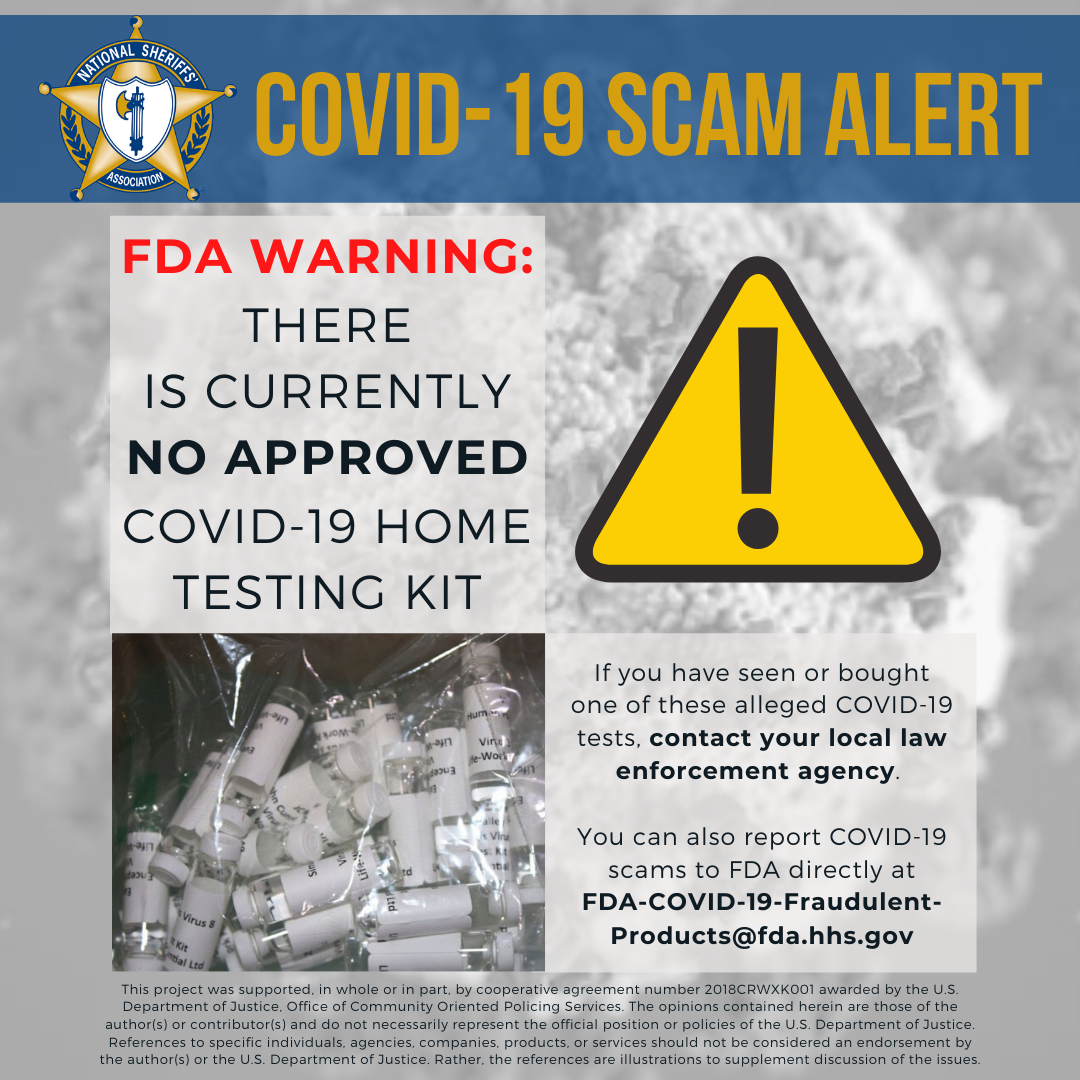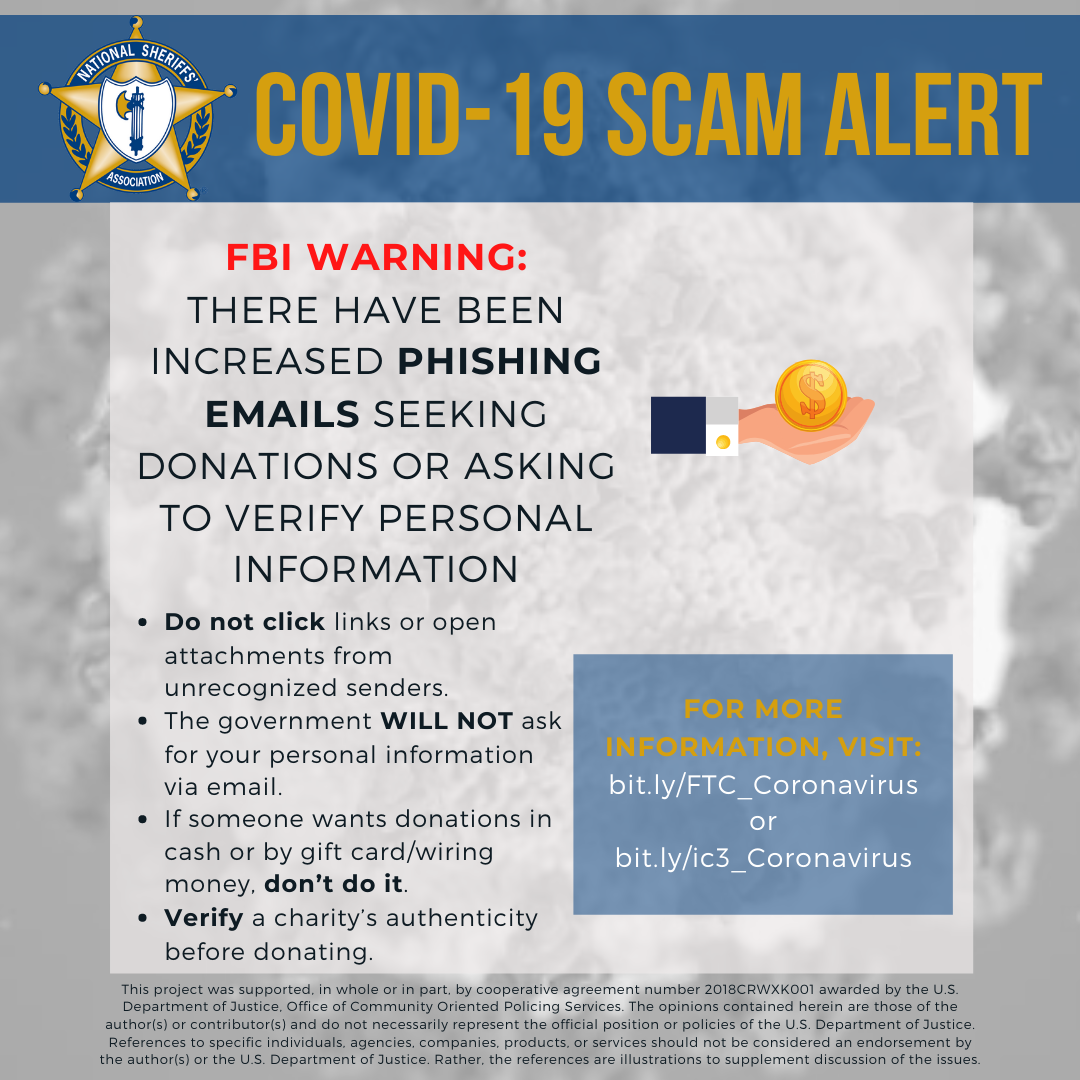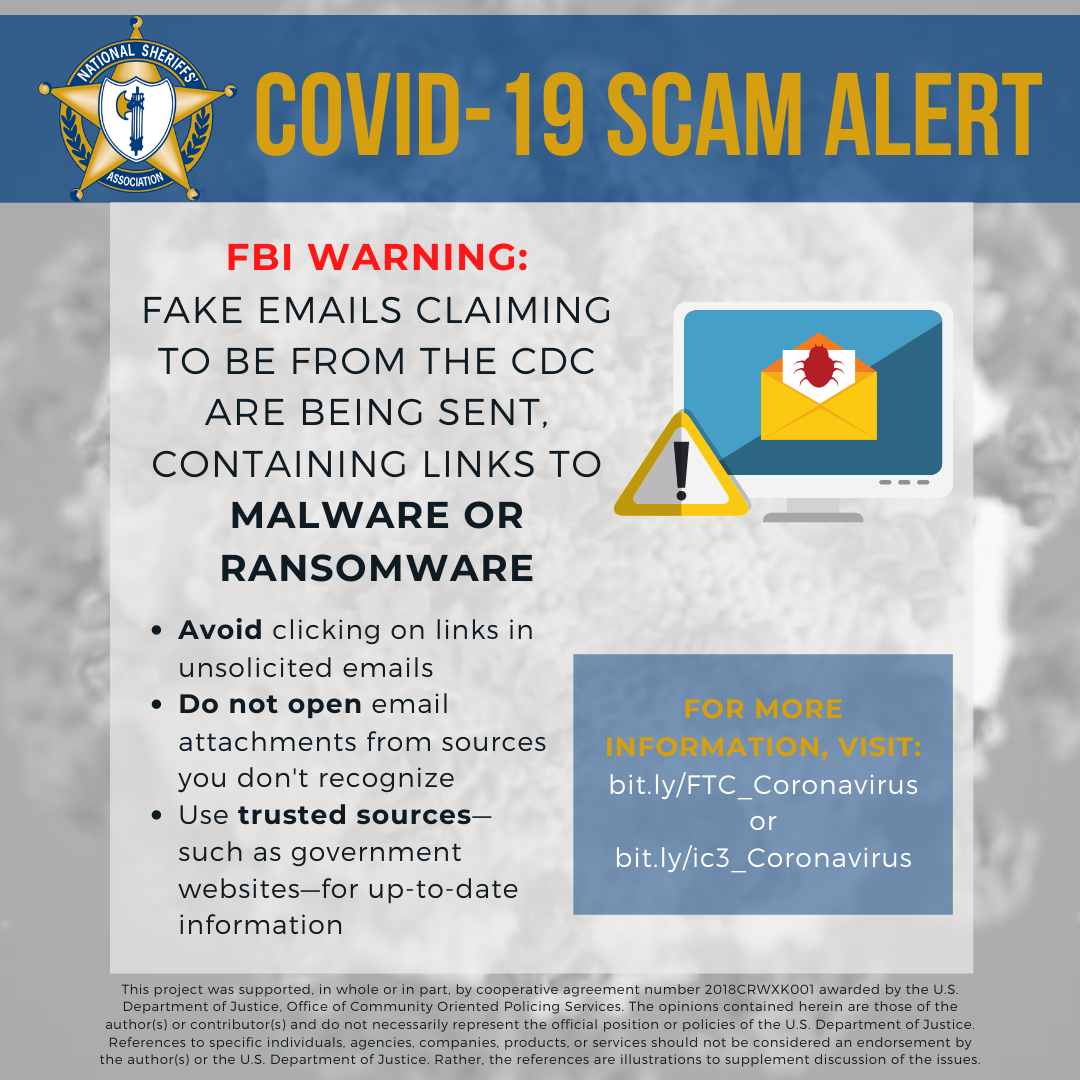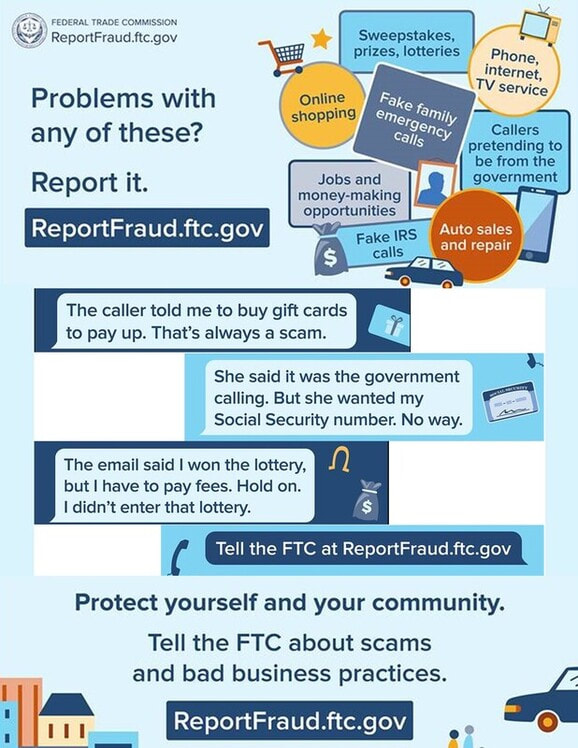Scam Alerts
|
DO YOU KNOW WHERE TO REPORT PHONE/INTERNET SCAMS?
When you receive phone calls or emails suspected to be scam or fraud related, the Federal Trade Commission has created a website ReportFraud.ftc.gov making it easy to report fraud, scams, and bad business practices for further investigation. Tips To Use To Avoid Becoming A Victim Of A Scam
|
FRAUDULENT UNEMPLOYMENT INSURANCE CLAIMS
The Commonwealth of KY and US Government maintain all the records associated with these claims.
If you are a victim, it is very important that you report the identity theft fraud to ALL of the following entities, but especially the first one:
•The Kentucky Office of Unemployment Insurance
secure.kentucky.gov/FormServices/UI/Fraud
•Your employer
•National Center for Disaster Fraud
justice.gov/.../ncdf-disaster-complaint-form
•Federal Trade Commission (FTC)
identitytheft.gov
•Local police department to obtain a copy of a report to provide to creditors and credit agencies
The Commonwealth of KY and US Government maintain all the records associated with these claims.
If you are a victim, it is very important that you report the identity theft fraud to ALL of the following entities, but especially the first one:
•The Kentucky Office of Unemployment Insurance
secure.kentucky.gov/FormServices/UI/Fraud
•Your employer
•National Center for Disaster Fraud
justice.gov/.../ncdf-disaster-complaint-form
•Federal Trade Commission (FTC)
identitytheft.gov
•Local police department to obtain a copy of a report to provide to creditors and credit agencies
COVID-19 SCAMS
To profit from the generosity of Kentuckians, scammers may impersonate charities by requesting funds or gift cards to assist victims of the COVID-19 pandemic, including families, small businesses, and COVID-19 patients. Suspected charity scams related to COVID-19 can be reported to the Attorney General’s online scam reporting form or by calling the Consumer Protection Hotline at 1-888-432-9257.
To avoid COVID-19 charity scams, consumers should:
Medicaid beneficiaries who suspect fraud related to COVID-19 should collect as much information as possible from the scammer, including their name and phone number, and report the scam to the Attorney General’s Office of Medicaid Fraud and Abuse Control Hotline at 1-877-ABUSE TIP (1-877-228-7384.)
To avoid COVID-19 Medicaid scams, consumers should:
To profit from the generosity of Kentuckians, scammers may impersonate charities by requesting funds or gift cards to assist victims of the COVID-19 pandemic, including families, small businesses, and COVID-19 patients. Suspected charity scams related to COVID-19 can be reported to the Attorney General’s online scam reporting form or by calling the Consumer Protection Hotline at 1-888-432-9257.
To avoid COVID-19 charity scams, consumers should:
- Deflect attempts of telemarketers to rush or pressure you into donating to a nonprofit, charity, or fundraiser related to COVID-19. Before making a donation, research the charity to verify its legitimacy. Visit the Office of the Attorney General’s Tips on Charitable Giving for a list of questions to ask when solicited.
- Do not make donations in cash, gift cards, or money wires.
- Some Kentucky charities are required to register and report donations with the Office of the Attorney General. Visit our website for a list of charitable organizations and active charitable campaigns in Kentucky.
- Donate to charities you already know and trust, and, when possible, donate using the charity’s website rather than a social media or crowd-funding page.
Medicaid beneficiaries who suspect fraud related to COVID-19 should collect as much information as possible from the scammer, including their name and phone number, and report the scam to the Attorney General’s Office of Medicaid Fraud and Abuse Control Hotline at 1-877-ABUSE TIP (1-877-228-7384.)
To avoid COVID-19 Medicaid scams, consumers should:
- Be cautious of unsolicited requests for Medicaid numbers.
- Be suspicious of any unexpected calls or visitors offering COVID-19 tests or supplies. If your personal information is compromised, it could be used in other fraud schemes.
- Ignore offers or advertisements for COVID-19 testing or treatments.
- Contact your physician or other trusted healthcare provider if COVID-19 testing is needed. The Commonwealth’s COVID-19 website provides information on when to seek care for COVID-19.
NETFLIX, Apple & Amazon Scams
If you receive a text or email claiming to be from Netflix, Amazon or Apple informing you that your account has been cancelled, suspended or is on hold, or that there has been a large purchase made on your account, it is a scam / phishing attempt to gain your personal information.
If you click on the link provided, it will look like you have gone to the official website. There you will be required to put in your payment information. DO NOT ENTER ANY PERSONAL DATA ON THAT WEBSITE.
If you are concerned that your account is in jeopardy, go directly to app or open a blank web browser like Google or Safari to go to the website. At that point, you'll be able to determine if your account is still active.
If you do receive a scam text or email, report the incident to the FCC: reportfraud.ftc.gov
If you receive a text or email claiming to be from Netflix, Amazon or Apple informing you that your account has been cancelled, suspended or is on hold, or that there has been a large purchase made on your account, it is a scam / phishing attempt to gain your personal information.
If you click on the link provided, it will look like you have gone to the official website. There you will be required to put in your payment information. DO NOT ENTER ANY PERSONAL DATA ON THAT WEBSITE.
If you are concerned that your account is in jeopardy, go directly to app or open a blank web browser like Google or Safari to go to the website. At that point, you'll be able to determine if your account is still active.
If you do receive a scam text or email, report the incident to the FCC: reportfraud.ftc.gov
Norton Healthcare Scam
Victims report receiving a phone call from a person or automated caller who claims to be with Norton Healthcare. The caller states the healthcare entity needs additional information prior to their doctor’s appointment. It will ask you to press a series of numbers and then requests you enter personal information to confirm/expedite your doctor’s appointment. The phone number on your caller ID may be ‘spoofed’ to make it appear this is a legitimate call. Victims reported the following number: 502-239-3228, as well as other 502 area code Please realize this is a scam! Do not provide personal information if you receive this call. You may call Norton Heathcare at (502) 479-6300 or (800) 874-3979 to speak to a legitimate customer service representative.
Victims report receiving a phone call from a person or automated caller who claims to be with Norton Healthcare. The caller states the healthcare entity needs additional information prior to their doctor’s appointment. It will ask you to press a series of numbers and then requests you enter personal information to confirm/expedite your doctor’s appointment. The phone number on your caller ID may be ‘spoofed’ to make it appear this is a legitimate call. Victims reported the following number: 502-239-3228, as well as other 502 area code Please realize this is a scam! Do not provide personal information if you receive this call. You may call Norton Heathcare at (502) 479-6300 or (800) 874-3979 to speak to a legitimate customer service representative.
Arrest Warrant Scam
Victims report receiving a phone call stating a warrant has been issued for their arrest due to their failure to appear for jury duty or for failure to comply with the sex offender registry. The caller, who claims to be a deputy with a Sheriff’s Office Warrants division or a State Trooper, instructs the victim to provide a prepaid card to void the warrant and avoid arrest.
Reminder to residents: the majority of the time a valid arrest warrant is served in person by law enforcement officials; however, in some circumstances a law enforcement official may call you if you have a warrant, but under no circumstance will the officer ever ask for money or any form of payment
Victims report receiving a phone call stating a warrant has been issued for their arrest due to their failure to appear for jury duty or for failure to comply with the sex offender registry. The caller, who claims to be a deputy with a Sheriff’s Office Warrants division or a State Trooper, instructs the victim to provide a prepaid card to void the warrant and avoid arrest.
Reminder to residents: the majority of the time a valid arrest warrant is served in person by law enforcement officials; however, in some circumstances a law enforcement official may call you if you have a warrant, but under no circumstance will the officer ever ask for money or any form of payment
Family Member Scam
Victims report receiving a phone call from someone who claims to be a family member. The suspect begins to tell them they are in trouble or have been arrested and need money wired to them immediately. Always call local law enforcement to verify an arrest. Many times, the scammers will ‘spoof’ the number which means the number on your caller ID may appear legitimate to a local jail or police agency, when in reality, it originates from overseas, via a voice over internet protocol computer application.
Victims report receiving a phone call from someone who claims to be a family member. The suspect begins to tell them they are in trouble or have been arrested and need money wired to them immediately. Always call local law enforcement to verify an arrest. Many times, the scammers will ‘spoof’ the number which means the number on your caller ID may appear legitimate to a local jail or police agency, when in reality, it originates from overseas, via a voice over internet protocol computer application.
Equifax Scam
Victims report receiving a phone call from someone who claims to be from Equifax calling to verify your account information. Do NOT give out any personal information over the phone
Victims report receiving a phone call from someone who claims to be from Equifax calling to verify your account information. Do NOT give out any personal information over the phone
West African Money Scam
Victims report receiving a request on social media sites or apps such as Facebook or WhatsApp from an individual they do not know who will begin to message them. The suspect will continue to converse with the victim over a period of days, while speaking lovingly and affectionately and will use endearing terms such as “soul mate.” Victims then report the suspect will ask them to perform an act such as sending nude photographs or performing sexual acts live on a social media app. Once the act is complete, the suspects will state they are underage and what the victim has done is criminal behavior. The suspect will then threaten to go to the police or the victim’s family and friends if they do not send money to them in the form of a MoneyGram or some other wire transfer to the Bank of West Africa. This is a scam!
Here are some tips to be on the lookout for to avoid becoming a victim of this scam:
Victims report receiving a request on social media sites or apps such as Facebook or WhatsApp from an individual they do not know who will begin to message them. The suspect will continue to converse with the victim over a period of days, while speaking lovingly and affectionately and will use endearing terms such as “soul mate.” Victims then report the suspect will ask them to perform an act such as sending nude photographs or performing sexual acts live on a social media app. Once the act is complete, the suspects will state they are underage and what the victim has done is criminal behavior. The suspect will then threaten to go to the police or the victim’s family and friends if they do not send money to them in the form of a MoneyGram or some other wire transfer to the Bank of West Africa. This is a scam!
Here are some tips to be on the lookout for to avoid becoming a victim of this scam:
- The suspects are reported to make a common profile using fake photographs and information to create the appearance they are American.
- The suspect’s profile will have indicators they are not from this area, such as an abundance of friends with African surnames. They will also “like” many groups from the areas of Nigeria, Ghana, and the Ivory Coast, as well as other African nations.
- The suspects will have difficulty typing properly in the English language. Pay particular attention to their verbiage.
Federal Bureau of Investigation (FBI) Email Scam
Businesses may be contacted by fraudulent email accounts appearing to be from the Federal Bureau of Investigation (FBI). The email advises the recipient that following an investigation using the FBI Intelligence Monitoring Network System, it was discovered the user has been scammed and has been approved to receive approximately $800,000 in compensation.
The users are instructed to pay $2,500 worth of required up-front fees, which include deposit and cashier’s check conversion fees, via wire transfer or prepaid money cards, in order to receive their compensation.
Anyone receiving such emails should not respond to the email in anyway, but report the incident to the FBI immediately online at www.ic3.gov.
Businesses may be contacted by fraudulent email accounts appearing to be from the Federal Bureau of Investigation (FBI). The email advises the recipient that following an investigation using the FBI Intelligence Monitoring Network System, it was discovered the user has been scammed and has been approved to receive approximately $800,000 in compensation.
The users are instructed to pay $2,500 worth of required up-front fees, which include deposit and cashier’s check conversion fees, via wire transfer or prepaid money cards, in order to receive their compensation.
Anyone receiving such emails should not respond to the email in anyway, but report the incident to the FBI immediately online at www.ic3.gov.




